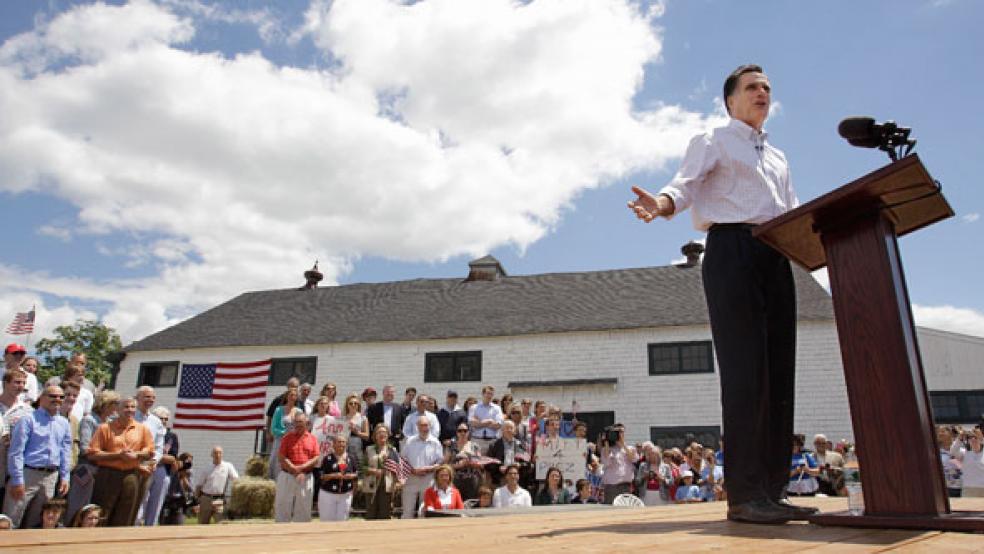While Sarah Palin was grabbing headlines with her East Coast bus tour, former Massachusetts governor Mitt Romney formally announced his candidacy for president Thursday with a speech in New Hampshire that sternly criticized Obama’s handling of the troubled economy. Romney also offered a formula for reducing unemployment and getting the economy back on track: “Barack Obama has failed America. From my first day in office, my number one job will be to see that America once again is number one in job creation.”
Another Republican presidential aspirant, former Minnesota governor Tim Pawlenty, has been beating the bushes in Iowa, trying to generate enthusiasm for his campaign. Pawlenty is engaging in retail politics, meeting with small groups of Iowans – as he did earlier this week at a coffee with 20 Republicans near tiny Orange City – to lay the foundation for a strong showing at next year’s Iowa caucuses.
In all, eight Republicans have either tossed their hats in the ring or are on the verge of doing so. Yet their best efforts are being overshadowed by Palin’s cat-and-mouse game with the media as she, her family and her entourage have spent the better part of a week making largely unannounced stops at historical sites between Washington and New Hampshire, all while fueling speculation that she might seek the GOP presidential nomination.
Many analysts believe that, like Donald Trump before her, Palin will ultimately opt out of the race. But political analysts and the news media have been wrong about her before, and for now, she’s casting a long shadow over the GOP presidential field.
Palin criticized Romney’s Massachusetts health-care plan ahead of her arrival in New Hampshire yesterday evening for a clambake, just hours after Romney officially launched his campaign. According to Politico she called the timing “coincidental.” But while Palin decides her next political move, others must worry about the political calendar as they assemble campaigns, raise money, and begin to line up support for primaries and caucuses. With the economy and the deficit front and center, many of the Republican presidential aspirants have staked out positions on the federal debt and debt ceiling, spending cuts, Medicare and entitlement reform, and taxes.
Here is a summary of the main GOP candidates and where they stand on some of the most pressing fiscal issues:
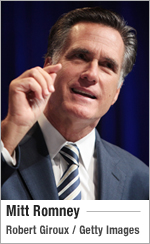
MITT ROMNEY
Romney, 64, has to be considered the front-runner for the Republican nomination, if for no other reason than his willingness to spend his personal fortune, which exceeded $200 million in 2007. The former Massachusetts governor who first ran for the Senate in 1994 against the late Sen. Ted Kennedy after a successful career as a business consultant and private equity investment fund manager will stress jobs and the economy in his second quest for the White House.
But the flip-flopper charge successfully leveled against him by Sen. John McCain, R-Ariz., in 2008 is likely to haunt him during the 2012 campaign, in large part because as governor he signed a sweeping health care reform bill that served as the model for President Obama’s Affordable Care Act. In a major address last month at the University of Michigan, Romney attacked “Obamacare” as “a power grab by the federal government to put a one-size-fits-all plan across the nation” and called instead for state-by-state solutions. In fact, “Romneycare” in Massachusetts included a state-based exchange for selling private insurance that individuals have to buy – the same approach used by Democrats that was vilified by Republicans on the campaign trail last year. “Obamacare” also allows for sharp variations in state approaches.
Over the years, Romney’s rightward march on social issues has mollified social conservative critics (he once embraced a woman’s right to choose, declaring in 1994, “abortion should be safe and legal in this country”). And his business background and experience as governor give him credibility on economic issues.
“We are only inches away from ceasing to be a free market economy,” he said on Thursday. “I will cap federal spending at 20 percent or less of the GDP and finally, finally, balance the budget.” As governor, however, he balanced Massachusetts’ budget by raising taxes and fees as well as by cutting spending.
-----------------------------------------
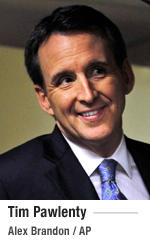
TIM PAWLENTY
The former Minnesota governor announced his campaign on May 23, vowing to “tackle and fix” the budget deficit and the debt and to “get this economy back on track.” A native of St. Paul, Pawlenty, 50, served five terms as a state representative before winning election as governor.
The mild-mannered, understated Pawlenty projects an air of competence, but has trouble exciting a crowd. During his two terms as governor, between 2003 and 2011, he eliminated his state's budget deficit using spending cuts and borrowing heavily from earmarked funds, and cut business taxes after raising cigarette taxes and assorted fees in his first term. His administration advocated for many public works projects, and he cut health care spending to help balance the budget.
As a presidential candidate, Pawlenty has opposed raising the debt ceiling, arguing that the Obama administration could avert defaulting on the U.S. debt by sequencing government spending and prioritizing payments of interest and principle. He would reduce the deficit by eliminating wasteful spending, including ethanol subsidies, and overhauling Medicare, Social Security and other entitlement programs. He’s proposed raising the Social Security retirement age and means testing Social Security’s cost of living adjustments. He would also convert Medicaid to a block grant to the states with tight spending limits, while transforming Medicare for seniors “to a more efficient, pay-for-performance model.” He opposes raising taxes to help close the deficit gap.
-----------------------------------------
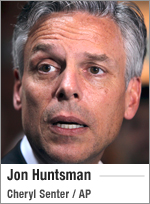
JON HUNTSMAN, JR.
Huntsman is a 51-year-old Republican who served as the 16th governor of Utah, resigning during his second term to accept President Obama’s appointment as ambassador to China. He held that post for two years before resigning. In 2008, Huntsman’s co-chaired Sen. John McCain’s campaign for president and was appointed a key adviser. Before entering politics, Huntsman was an executive for the Huntsman Corporation, a global chemical company that his father founded in 1970. Married with seven children, he is a member of the Church of Jesus Christ of Latter-day Saints.
Though some Republicans question whether Huntsman is conservative enough to win the nomination, he’s compiled a staunchly conservative record in Utah on matters ranging from abortion to the budget. While in office, he cut and flattened tax rates during the Great Recession, which helped Utah maintain its AAA bond rating. Utah was also named the best-managed state in the nation, according to Pew Center on the States study in 2008.
Huntsman hasn’t yet formally announced for president, but he’s publicly endorsed Rep. Paul Ryan’s budget proposal, including its controversial approach to overhauling Medicare by converting it to a subsidized voucher. Huntsman has also said he would pair any debt ceiling hike with spending cuts, and of the cuts, he believes significant savings can be realized through a more judicious use of U.S. military assets, by getting involved in fewer interventions that require large deployments. He supports tax reform to stimulate capital formation, including lowering the corporate tax rate from 35 percent to 24 percent, lowering income tax rates, and closing the tax gap.
-----------------------------------------
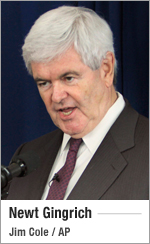
NEWT GINGRICH
A veteran of the House and a prolific scholar, Gingrich, 67, loomed as a strong GOP contender for a while. But a series of gaffes raised doubts about his credentials to serve as president and diminished his hopes of landing the nomination.
The former Speaker of the House flirted with a presidential run in 2008 but then dropped the idea, citing his inability to leave American Solutions, the web of fundraising and policy groups he created after leaving office in 1999. This year he left little doubt: he intended to run for president. But within his first week as a candidate, the fiscal conservative was on the defensive after blasting the House Republicans’ plan to overhaul Medicare on NBC’s “Meet the Press,” while defending a central tenet of the Democrats’ health care law. Soon after, Gingrich disavowed his statement and embraced the GOP Medicare plan.
Gingrich has outlined a five-point plan for his campaign. He says he would push for sweeping tax cuts, “very serious deregulation” and strict limits on unemployment benefits after four weeks. He would eliminate the National Labor Relations Board, replace the Environmental Protection Agency, and repeal the national health care plan. His plan also includes no tax increases in 2013; eliminating the capital gains tax; allowing companies to deduct capital expenses fully; reducing the corporate tax rate to Ireland's rate of 12.5 percent; and abolishing the death tax. Echoing House Republicans, Gingrich said he would generate revenue through growth, not taxation, as a way to jump-start the economic recovery.
-----------------------------------------
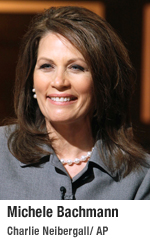
MICHELE BACHMANN
Nobody can deny that Tea Party maven Bachmann, R-Minn., has ambition and firepower. But now that the 55-year-old House member from Minnesota is weighing a presidential bid, it’s unclear whether the ultra-conservative constitution-enthusiast can appeal to Republicans outside the Tea Party.
A former tax attorney, Bachmann was elected to Minnesota’s 6th congressional district in 2006 after serving six years in the state Senate. A born-again Christian, Bachmann first appeared on the public radar in an October 2008 MSNBC appearance when she called then-presidential candidate Barack Obama and other Democrats “anti-American,” and urged Congress to probe the issue. She went on to raise more than $11 million for her 2010 reelection bid — the most by any House candidate — and to form and lead the official House Tea Party Caucus.
After the election, she was passed over for a House Republican leadership post, but stayed in the spotlight when she delivered the first-ever Tea Party rebuttal to President Obama’s 2011 State of the Union Address, separate from the official Republican rebuttal from House Budget Chairman Paul Ryan.
One of the most conservative members of the House of Representatives, Bachmann adamantly opposes any form of tax increase and favors limiting the size and scope of government. She wants to lower the corporate tax rate from 35 percent to 9 percent and eliminate the capital gains and estate taxes. Though she staunchly opposes raising the country’s $14.3 trillion debt limit without significant spending cuts attached, earlier this week she called the debate “a gift on a platter” for Congress to show it’s serious about controlling the deficit, She also recently accused Treasury Secretary Tim Geithner of exaggerating and scare-mongering by saying failure to raise the debt limit could lead the U.S. into a catastrophic default. She favors “weaning” Americans off Medicare and Social Security.
While she voted for the House Republican plan for overhauling Medicare she recently came out in favor of repackaging that proposal as “the 55 and under plan,” to make sure current seniors realize their benefits would be protected.
-----------------------------------------
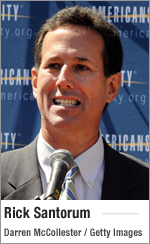
RICK SANTORUM
A former two-term Pennsylvania senator, Santorum lost his reelection bid in 2006 to Bob Casey. He, too, is now a candidate for president. The 53-year-old former House member stresses his conservative Catholic views on social issues, but he has also aligned himself with the Tea Party fiscally. A lawyer by training, Santorum is married with seven children.
Though he’s yet to ink a detailed platform, Santorum has said that he favors job creation through private business expansion and supports a reduction in government regulations. He’s also called for overhauling Social Security, but has provided no details. Santorum has publicly supported Rep. Paul Ryan’s “Roadmap for America” budget plan to overhaul Medicare and cut federal spending. Santorum also said he is opposed to raising the debt ceiling unless the legislation is linked to spending cut measures to get “our exploding debt under control.”
As for health care reform, Santorum has said President Obama’s new health care reform law should be repealed.
-----------------------------------------
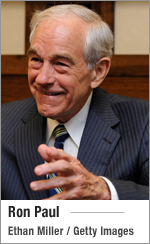
RON PAUL
A spirited Texas House member known for his often-unorthodox commitment to Libertarian ideals, Paul announced his presidential candidacy (his third) last month. The 75-year-old obstetrician and Air Force veteran has been in and out of Congress since 1976 and is regarded by some as an originator of what has evolved into today’s Tea Party.
A free-market enthusiast, Paul has proposed getting rid of any program, law or agency that he sees as impinging on the free market or violating the Constitution, which has earned him the nickname “Dr. No.”
In 1987, Paul denounced the GOP and left the party because of President Ronald Reagan’s inability to balance the federal budget, and declared himself a Libertarian. He opposes all foreign aid and has voted against every U.S. foreign intervention, except Afghanistan. He’s repeatedly called for the abolishment of the Federal Reserve, or at least tougher oversight. He would also abolish the federal income tax and the Internal Revenue Service.
Paul has pushed to legalize drugs on the federal level, and to give states the choice of whether to regulate them or not. He’s also called the departments of Energy, Education, Agriculture, Commerce, Health and Human Services, Homeland Security, and Labor unconstitutional. Despite representing a rural district, he has voted against farm subsidies.
-----------------------------------------
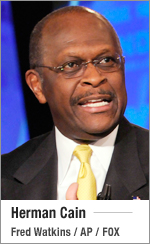
HERMAN CAIN
The wealthy entrepreneur and former president and CEO of Godfather’s Pizza announced his bid on May 21 at a rally in Atlanta. Cain promised to travel across the country to discuss the most urgent problems facing the U.S. and to “share my common sense solutions.” In summing up “the Cain Doctrine,” the 65-year-old businessman said, “We ain’t raising the debt ceiling . . . We are going to cut the spending.”
The Georgia-born Cain, the only African-American GOP candidate, has had broad experience as a businessman, media celebrity and fiscal expert. He has worked for Coca-Cola, Pillsbury, and Burger King. He is a former deputy chair (1992–94) and chair (1995–96) of the civilian board of directors to the Federal Reserve Bank of Kansas City. Before his business and economics career, he worked as a mathematician in ballistics for the U.S. Navy. Cain’s newspaper column is distributed by North Star Writers Group.
Highly critical of the Dodd-Frank financial overhaul legislation, Cain vows to eliminate cumbersome federal regulations that he says are frustrating economic growth. He favors “modernizing” and privatizing Social Security, Medicare and other entitlement programs “to get the federal government out of the way,” and he would repeal Obama’s health care reform legislation. He favors major tax reform, including across-the board-tax cuts for businesses and individuals – including reduction in the capital gains tax – and would permanently eliminate the estate tax.
Jennifer DePaul, Michelle Hirsch and Adam Cory Ross of the Fiscal Times contributed to this report.
Related Links:
Mitt Romney Kicks Off 2012 Presidential Bid (USA Today)
Ron Paul Leads Sarah Palin and Mitt Romney in Republican (Book) Race (LA Times)

